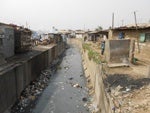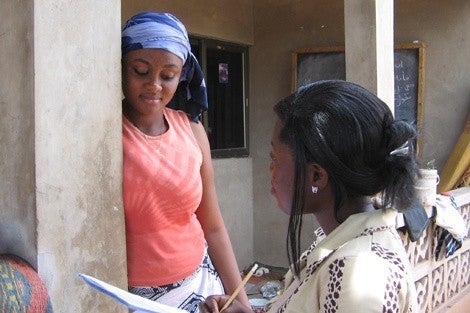March 13, 2013 — Public health resources in Africa have long been devoted to infectious diseases such as AIDS and malaria and, for women, reproductive health services. But while these services are vital, the health needs of a growing population of African women who are living longer are not being met, says [[Allan Hill]], Andelot Professor of Demography at Harvard School of Public Health (HSPH).
In large African cities such as Accra, Ghana, where Hill with his Ghanaian counterparts has led a pioneering women’s health study for the past decade, women are having fewer children, living longer, and getting heavier. That presents new health challenges the current Ghanaian health system is not equipped to address, such as rising incidence of heart disease and other chronic diseases more characteristic of the Western world.
“The growing population of post-menopausal women in Ghana represents a major shift,” Hill said. Ghanaian women see their doctors primarily during pregnancies, and there has been very little thought devoted to addressing women’s health needs beyond reproduction, he said. “We are working with our colleagues in Ghana on identifying ways to address this gap, such as offering coverage for preventive services like cholesterol screening through the country’s health insurance system.”

Hill first witnessed the continent’s changing demographics while working in rural areas on children’s health and other projects. More people were moving out of villages to the cities and chronic disease was on the rise. Awarded a Fulbright scholarship in 2001, Hill took a leave of absence from HSPH to collaborate with the University of Ghana on what became known as the Women’s Health Study of Accra.
The study’s first wave included a household survey in 2001 of 3,182 women and a clinical examination of 1,328 women from the same cohort. Researchers collected information on both reproductive and general health from household interview surveys, comprehensive clinical histories, and physical examinations. They followed up with women in 2008 in Wave II of the study, this time directed in Accra by Nedialka Douptcheva, SM ’06 .

Through the use of satellite imagery analyzed by teams of faculty and students led by John Weeks of San Diego State University and David Rain and Ryan Engstrom of George Washington University, Hill and his colleagues are now gathering even more information about the women’s lives. In sprawling Accra, a well-to-do neighborhood may be adjacent to a slum or a polluted body of water. This new technology provides the ability to more accurately assess the risks posed by each woman’s environment, from asthma-exacerbating traffic to areas that may harbor malaria-infested mosquitoes.
The researchers have published numerous papers on findings from the Women’s Health Study on topics ranging from access to cervical cancer screening to the prevalence of elevated blood pressure in the study population. The most recent series of papers, published in June 2012 in a special supplement of Ghana Medical Journal, further outlined the changing picture of women’s health in a modern African city. Among the findings:
- Women in Accra are having fewer children— just 2.5 on average —than the high rates common in other parts of Africa. This is contributing to the relatively good health of young women in this population. However, as these women pass their reproductive years they get sicker and see the doctor less often.
- The body mass indices of Accra women are higher than women of the same age in the United Kingdom, themselves the heaviest women in Europe. The rise in obesity in Accra has been paralleled by a rise in chronic disease, with heart disease now the most common cause of death for women in the city.
- Barely any women (0.4%) had seen a mental health professional the previous year, representing a potentially large unmet need. As trained mental health professionals are in short supply in Ghana, more community-based options are needed to provide mental health services for women.
The data generated by Hill’s study is also being used in a host of additional projects: women’s use of abortion for family planning, led by Kelly Blanchard, SM ’97, of IBIS Reproductive Health; the effects of reproduction on work, led by Günther Fink, assistant professor of international health economics at HSPH; the health of women living in slums, led by Livia Montana, SD ’11; malaria studies led by Shawna Horn-Marine McNally, SM ’09 and Catherine Donovan, SM ’08; obesity and women’s body image perceptions, led by Rachel Benkeser, SM ’10; and the health effects of air pollution, led by doctoral student Raphael Arku.
All of the work by Hill and the other HSPH researchers is conducted in close collaboration with Ghanaian colleagues who have taken the findings to heart, Hill said. The Ghanaian co-director of the study, Richard Adanu, is now the dean of the Ghana School of Public Health where he is working actively to identify the support necessary for Wave III of the Women’s Health Study of Accra. Clement Ahiadeke, director of the Institute for Statistical, Social and Economic Research at the University of Ghana where Waves I and II of the study were based, continues to publish and direct research on the findings collected by the Accra studies.
Ongoing dissemination of the data on reproductive health and fertility is led by John Anarfi of the Regional Institute for Population Studies at the University of Ghana. Further analysis of the Women’s Health Survey data is under way by Ghanaians in Ghana and in doctoral programs at Harvard, the UK’s University of Southampton, and San Diego State University.
Researchers are now focused on the testing and implementation of successful interventions to address the complex women’s health issues in Accra’s rapidly developing urban society. Hill and his colleagues intend to launch a third phase of the study, this time going farther back in the women’s health histories to pinpoint factors that may be precursors to current disease. They also hope to start testing interventions including a weight-control program.
Photos courtesy of Allan Hill
